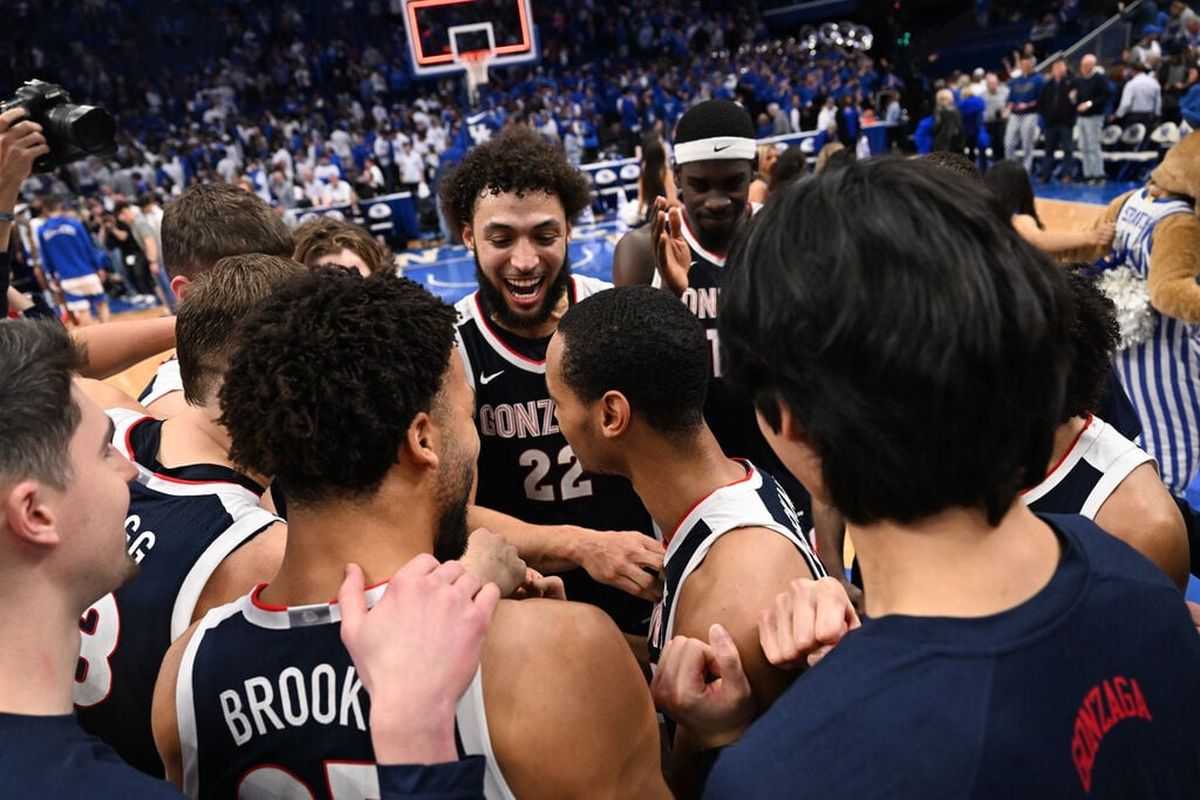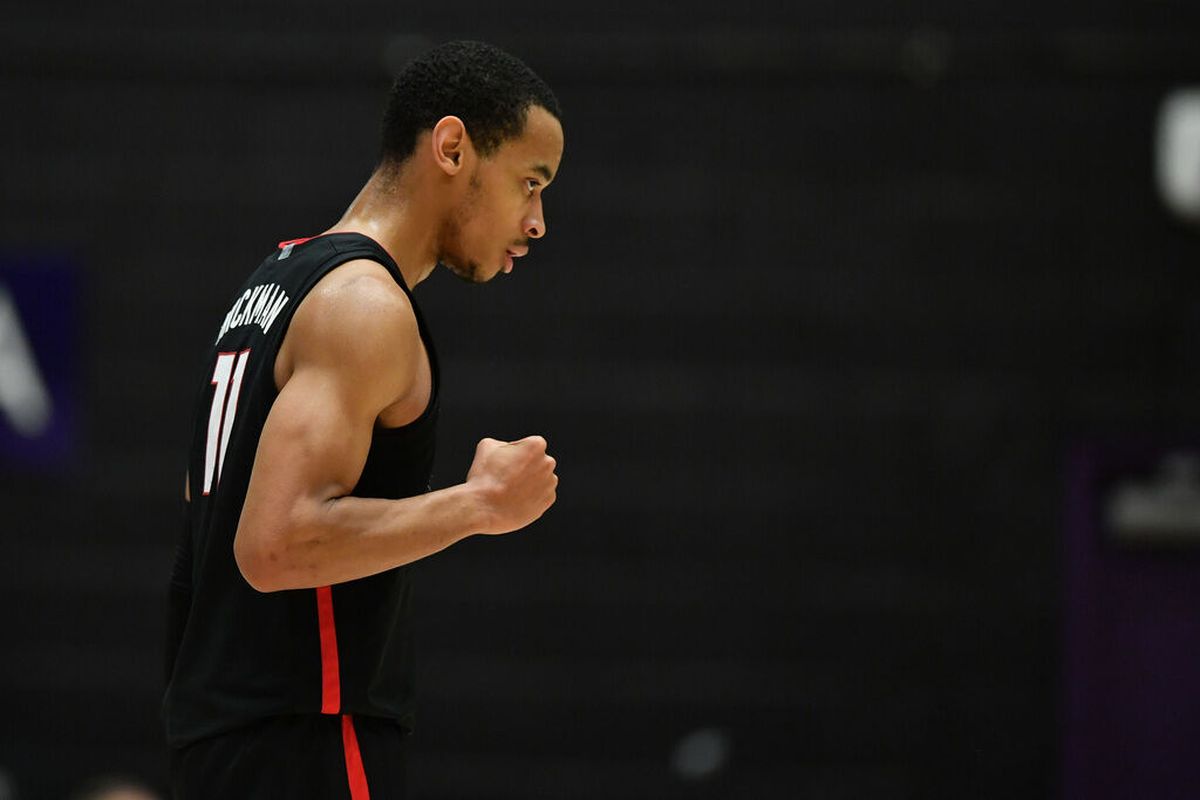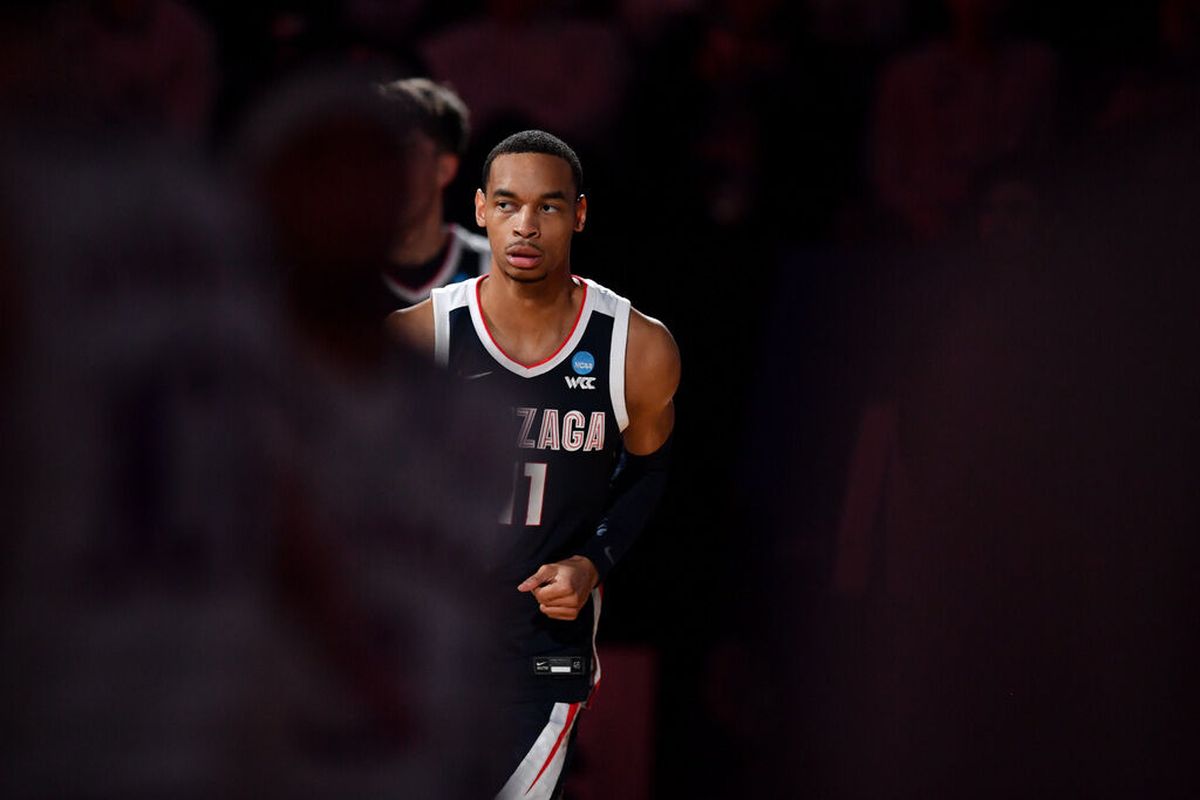How Nolan Hickman has found joy in a journal to navigate – and document – life as Gonzaga’s most scrutinized player
Gonzaga guard Nolan Hickman is framed by Kansas players as he is introduced before the first half of an NCAA Tournament second game on Saturday at the Delta Center in Salt Lake City. (Tyler Tjomsland / The Spokesman-Review)
DETROIT – Earlier this month, as Gonzaga was revving up for its 25th consecutive appearance at the NCAA Tournament, Nolan Hickman took a few moments to himself to process what he’d encounter over the next week, or weeks, if the Bulldogs made another one of their patented March runs.
How would Hickman react in the high-pressure moments? How would he navigate the emotional swings that are unequivocally unique to the NCAA experience? How would he respond to a thread of flattering comments on social media if he played well, or an even longer thread of cruel ones if he didn’t?
Hickman processed, removed the lid from a ballpoint pen, opened the notepad that’s been as sacred to the 20-year-old’s journey as any basketball-related item the past two years, and jotted down eight words.
“Never too high, never too low. Steady pace.”
So far this season, and this NCAA Tournament, Hickman’s found the sweet spot, hovering somewhere in the middle and operating at just the right speed for a Gonzaga team that finds itself back in the Sweet 16, in no small part because of the junior guard’s evolution.
If Hickman’s year-to-year statistical improvements are impressive – the Seattle native is averaging 13.9 points on nearly 47% shooting from the field and 41% from 3-point range after scoring 7.7 points on 42% shooting and 35% from 3 as a sophomore – the jump he’s made on the NCAA Tournament stage is staggering.
Hickman, whose role at Gonzaga has fluctuated and changed with the same frequency as Inland Northwest seasons, scored 14 total points through his first seven games in the Big Dance, connecting on just 6 of 27 shots from the field. Hickman wasn’t terribly efficient inside the arc, but he couldn’t do so much as will a 3-pointer into the basket, misfiring on each of his first 14 attempts.
Vowing to make sure another March didn’t come with more madness, Hickman took on a key leadership role in Gonzaga’s locker room, helped key the team’s midseason turnaround by becoming one of the country’s most efficient 3-point shooters, and casually shrugged off past NCAA Tournament performances to deliver in a big way for the Bulldogs twice last week in Salt Lake City.
He’s made 11 of 19 shots overall, knocked down 6 of 10 3-pointers, and scored 28 total points in consecutive 21-point wins over McNeese State and Kansas.
“I do think there is a growth process and I think Nolan’s met it with flying colors,” Gonzaga assistant Brian Michaelson said. “You look at his year-to-year improvement statistically and it’s drastic. It’s up there with the better jumps we’ve had.”
Hickman’s thoughts on the personal growth many of his coaches and peers have noticed these past 12 months?
“Just having no stress on the floor, no expectations from others,” he said. “I think that’s probably the biggest takeaway from this season.”
…
In 2022-23, the only time in Hickman’s career when Gonzaga didn’t have a Nembhard at its disposal, Few entrusted his first-year sophomore starter to set up the offense, make the right ball-screen reads, control the tempo and, above all, ensure the basketball eventually found its way into the hands of three-time All-American Drew Timme.
When the team struggled, fans felt the need to identify a scapegoat. That certainly wasn’t going to be Timme, nor was it Julian Strawther, Anton Watson or Rasir Bolton. Hickman, as the next man up on the totem pole, and the youngest one, naturally became an easy target.
With mounting expectations for a top-10 Gonzaga team, Hickman didn’t get the grace period other young players are given to grow into their role, and every mistake, unforced turnover, missed 3-pointer felt magnified with two quality guards – reigning SoCon Player of the Year Malachi Smith and former top-10 national recruit Hunter Sallis – awaiting their opportunity on Few’s bench.
Hickman was never in imminent danger of losing his spot, but his confidence wavered. It was hard to predict what the Zags would get on a nightly basis – perhaps the last thing any fanbase wants to hear about its point guard.
“He’s grown up a lot. He’s done a better job of being more even-keeled,” Few said. “Sometimes last year he was an emotional roller coaster based on performance.”
A blunt assessment, maybe, but an honest one and still nothing compared to the comments Hickman would routinely dig up on social media. Things like:
“Nolan Hickman is very uninspiring to watch.”
“I think in the last 3 years of watching gonzaga I’ve only seen about three good Nolan Hickman games.”
“Nolan Hickman absolutely crumbles in clutch situations. Dude just isn’t made for it.”
“Gonzaga would’ve lost to Kent State without Hunter Sallis’s defense. He should start over Nolan Hickman.”
“Nolan Hickman needs to be benched/transfer.”
At times, Hickman would go searching for the comments. Often he didn’t have to, thanks to social media users who’d tag his account in tweets, ensuring they’d be among the first notifications to appear on Hickman’s screen when he returned to Gonzaga’s locker room.
Hickman will occasionally indulge himself and engage with the faceless social media critics, but his responses are always light-hearted and never confrontational. If nothing else, Hickman will tap the heart button, or “like” button, down below as a stamp of acknowledgement.
“I like to let them know I’ve seen it, I’m taking everything in, whether you like or whether you don’t like it,” Hickman said. “I’m seeing everything.”
Seeing it is one thing, finding the right way to internalize it is another. That’s been another area of growth for Hickman over the past 12 months, in part because the guard decided to reinvest in himself, recalibrate and pick up an old hobby.
…
The journal is a catalogue of Hickman’s thoughts, thoughts others have about him, mental notes from games or practices, wandering ideas that pop into his stream of consciousness throughout the day, prayers, motivational quotes that strike his attention or anything else he feels compelled to scribble out.
Hickman could probably streamline the process and convert the journal entries over to an iPhone note, but there’s something pure about a clean sheet of paper and fresh ink.
“I just write the ones that stick out to me,” Hickman said, “or the significant ones that I may come back and add fuel to the fire or another chip I may need for the game or something.”
Hickman got away from journaling at some point in high school, but it’s something his family used to plan summers around. If Hickman got up 200 shots during the day, he was encouraged to open up a notebook later that night and document how they felt.
“So we’ve always encouraged the journal and write down your thoughts and watch them grow and what they flourish into,” Hickman’s father, Nolan Sr., said during a phone interview this week. “Even if it’s a business plan, come back to it two years from now. Go read some of your old journals.”
Nolan Sr. traces his first journal entries back to the seventh grade, when he met another junior high student named Champale, who’d always been a strong advocate for journaling and creative writing.
Decades later, they’d enforce many of the same values to their children. When Champale sent Nolan back to Gonzaga before the start of the school year, she packed up his clothes, loaded a handful of other items from home and slipped in a new journal.
“We’ve never asked him what’s in it,” Nolan Sr. said. “My wife pries. She’s the one that wants to know, what are you actually, are you putting substance in there or are you putting the girl you tried to talk to at the party didn’t want to talk to you?”
Hickman didn’t want to divulge too much during a media availability in GU’s locker room last week at the Delta Center, only sharing the “Never too high, never too low” mantra.
“It’s such an emotional game, especially this time in March,” Hickman said. “It’s so emotional, you tend to get into your head a lot and try to just make sure, never too high, never too low.”
…
Hickman’s spending less time in his own head these days and trying to be a positive influence for younger teammates to make sure they don’t encounter the same pitfalls he did.
“The way he’s been leading the younger guys has been special,” junior forward Ben Gregg said.
Hickman’s been a sounding board for freshmen such as Dusty Stromer and Braden Huff, imparting wisdom on the youngsters who’ve become crucial members of GU’s rotation this postseason.
If Few grills Stromer for a missed assignment in practice, Hickman’s voice is often the next one he hears. If Stromer needs additional support, Hickman’s been known to call up his freshman teammate and suggest they go to lunch and talk it over.
“Those have all been big steps, too,” Michaelson said, “because this roster’s needed those things.”
Last spring, in the weeks and months after the season, Hickman’s father began receiving calls from his son’s AAU coaches. Others in the basketball world had started reaching out to the AAU coaches, inquiring about Hickman’s future at Gonzaga, as if it was about to change given how the end of the 2022-23 season unfolded.
“Nolan hasn’t called anyone. He hasn’t even been to the office, he doesn’t know what to sign to even be in the portal,” Nolan Sr. said, recalling the experience. “He’s going to figure it out here. He doesn’t consider himself a kid that needs to chase. He’s like, ‘I want to slay the dragon here.’ ”
Hickman reassured he had no intentions of wearing another uniform this season.
“I’m a firm believer if you start somewhere, you should finish it,” Hickman said, noting he’s been with the Seattle Rotary AAU program since the third grade and the only instance of him separating from a team came when he transferred from Eastside Catholic in Sammamish, Washington, to Wasatch (Utah) Academy – a move he felt was necessary for his college recruitment. “I didn’t really care what anybody else was feeling, thinking, but I feel like this was the right place for me. It’s been showing, especially this year.”
In an era where college basketball players are increasingly more likely to seek out the next opportunity, rather than see the current one through, Hickman’s been a rare example of someone who’s kept both feet planted through adversity.
“He’s playing confident and we need him,” Watson said. “He plays 40 minutes, he plays good defense and he creates a spark on the offensive end. I’m just proud of him and the growth he’s had all year.”
Possibly the only thing that’s grown more than Hickman’s game? His perspective.
“Hey, I can’t be too bad,” Hickman laughed. “I can’t be too bad.”


